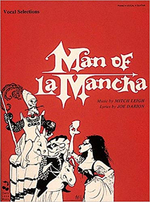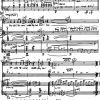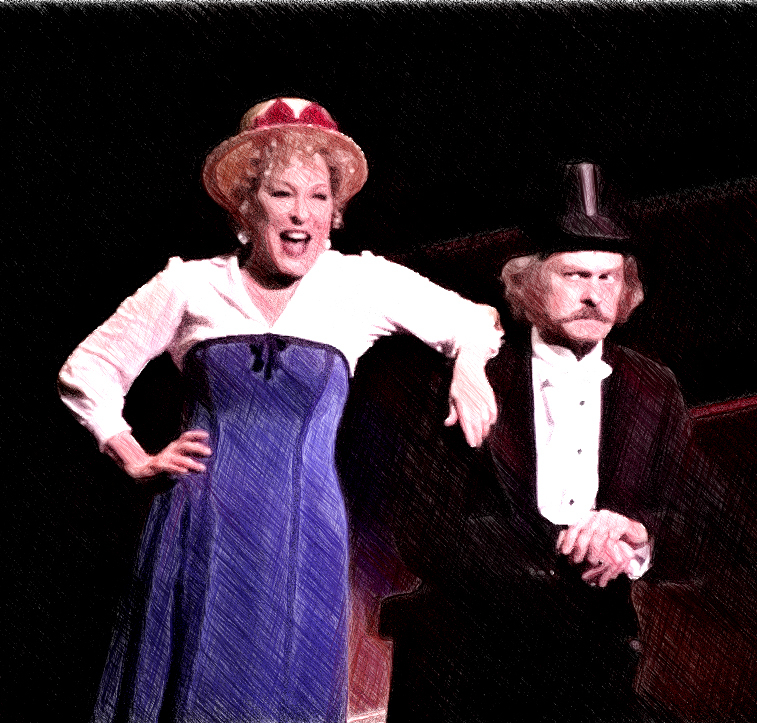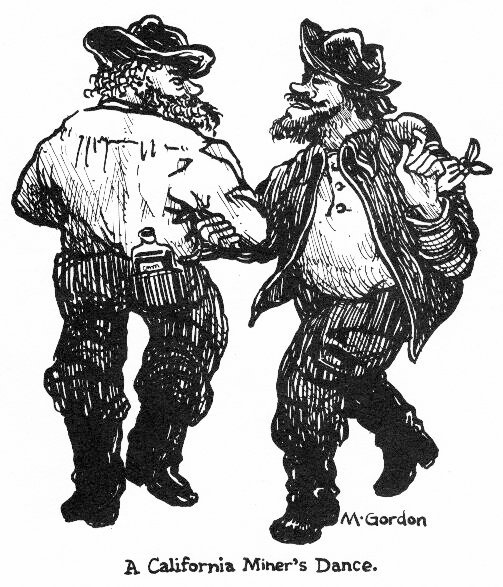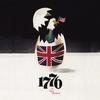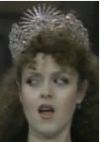Can Critics Learn to Love the Jukebox Musical?
#1Can Critics Learn to Love the Jukebox Musical?
Posted: 8/29/18 at 6:25pm
Can Critics Learn to Love the Jukebox Musical? (from the NYT)
Interesting read...
#2Can Critics Learn to Love the Jukebox Musical?
Posted: 8/29/18 at 9:38pm
Very telling article--Jesse Green being the most cynical:
"I’m happy for people to find pleasure in the theater however they can. But I keep looking for the jukebox musical that will bring to the genre the level of skill we see in shows like “Fun Home” and “Dear Evan Hansen” and “The Band’s Visit.” I watch way too many of these jukeboxes, whether comic or serious, and find myself saying: Couldn’t they do better than that?"
"It’s just that pop song forms are not the same as narrative song forms. Doesn’t mean they’re not great, or that they can’t advance a story. But partly because they were pre-written for a different context — or for no context — and partly because they tend to cycle through one generic emotion, they make character development difficult."
It'll be interesting to see the fate of the jukebox musicals opening this season.
#3Can Critics Learn to Love the Jukebox Musical?
Posted: 8/29/18 at 10:01pm
CukorLover said: "It'll be interesting to see the fate of the jukebox musicals opening this season."
I'm looking forward to Girl From the North Country breaking the critical mold. Though, as they mention, it's obviously pretty different from the kind of jukebox musicals we're usually talking about.
#4Can Critics Learn to Love the Jukebox Musical?
Posted: 8/29/18 at 10:25pm
I think a lot of the disdain sometimes comes from what Jesse Green points out: "The original versions are a high bar for me. I’d rather listen to them on my phone than see wan theatrical attempts to make them do things they can’t." It's not always a failure in the attempt but perhaps expectations overshadow any changes to the original tracks. But that could be said for revivals as well sometimes?
I'm still here, looking forward to The Cher Show and their assessment, anyway.
#5Can Critics Learn to Love the Jukebox Musical?
Posted: 8/29/18 at 10:32pm
Based on this article, I'd think THE CHER SHOW would be a prime target for Green and the others. From what I've heard and read, the show falls into every trap these critics have set.
I'm looking forward to it regardless. ![]()
#6Can Critics Learn to Love the Jukebox Musical?
Posted: 8/29/18 at 10:37pm
Maybe the reason critics don't like jukebox musicals is because they are mostly crap. Case in point - "Summer" - pure trash.
Updated On: 8/29/18 at 10:37 PM#7Can Critics Learn to Love the Jukebox Musical?
Posted: 8/30/18 at 8:37am
Personally, I don't have much interest in book musicals with Frankenstein Monster scores - sewn together from old parts and artificially revived. (Of course, most of them have Frankenstein Monster books as well - viz. Head Over Heels and Mamma Mia, much as the latter denies that it's a rehash of Buona Sera, Mrs. Campbell.)
I can acknowledge, however, that there is a part of our populace (how large I won't attempt to guess) who are happiest choosing entertainment that is already familiar to them.
#8Can Critics Learn to Love the Jukebox Musical?
Posted: 9/1/18 at 10:38pm
There's nothing wrong with jukebox musicals. They're a lot of fun, just like tribute bands can be very popular.
Just don't include them in the genre of musical theater. They contribute no new music to the cosmos. The risk of the audience leaving not humming the score doesn't exist because the audience is humming the score entering the theater.
Bach never wrote an opera. Would the opera world welcome a new opera on the life of Bach which featured his most famous compositions?
Don't think so.
#9Can Critics Learn to Love the Jukebox Musical?
Posted: 9/2/18 at 1:13am
"Musical Theater" has always been a popular art form, OlBlueEyes. Ask people like Steven Sondheim, James Lapine, etc. They certainly intended their shows to be popular; it's just that their taste (especially in the case of Sondheim) doesn't match popular expectations. Neither Hammerstein with Allegro nor Bernstein with Candide meant for their shows to be relegated to the opera house or the record collections of us fanboys and girls.
Saying Jersey Boys or Mamma Mia (much as I hated the latter) aren't part of "musical theater" is like saying Friday the 13th wasn't a movie. Or even worse: like saying Gone With the Wind isn't a novel. Every genre has banal successes and noble flops, along with many pieces that fall somewhere in between.
I agree with your general low regard for the jukebox musical, but there was one, brilliant exception: Ain't Misbehavin'. If you didn't see the original, I promise you it was the most thrilling show on Broadway in its day. Maybe Richard Maltby, Jr., should write a book on how he did it...
#10Can Critics Learn to Love the Jukebox Musical?
Posted: 9/2/18 at 11:39am
GavestonPS said: ""Musical Theater" has always been a popular art form, OlBlueEyes. Ask people like Steven Sondheim, James Lapine, etc. They certainly intended their shows to be popular; it's just that their taste (especially in the case of Sondheim) doesn't match popular expectations. Neither Hammerstein with Allegronor Bernstein with Candide meant for their shows to be relegated to the opera house or the record collections of us fanboys and girls.
Saying Jersey Boys or Mamma Mia (much as I hated the latter) aren't part of "musical theater" is like saying Friday the 13th wasn't a movie. Or even worse: like saying GoneWith the Wind isn't a novel.Every genre has banal successes and noble flops, along with many piecesthat fall somewhere in between.
I agree with your general low regard for the jukebox musical, but there was one, brilliant exception: Ain't Misbehavin'. If you didn't see the original, I promise you it was the most thrilling show on Broadway in its day. Maybe Richard Maltby, Jr., should write a book on how he did it..."
The original Ain't Misbehavin' was exhilarating. It wasn't a linear "book musical", more like character vignettes, but the way it all came together was sensational. I think it differs from jukebox musicals because many of those Fats Waller songs had been long forgotten by that point and had never come anywhere near a jukebox. It's still a great example of how to take a canon of work and turn it into a theatrical experience. The 1982 televised version is on youtube and is worth a look.
#11Can Critics Learn to Love the Jukebox Musical?
Posted: 9/2/18 at 11:57am
The Times piece sort of acknowledges the difference between a revue and a jukebox musical. The former makes no attempt at a linear story. Ain’t Misbehavin’ and Smokey Joe’s are definitely revues. However, an important difference between those two shows is that much of the material in the former was relatively unknown to the average audience, whereas every song (I think) in the latter is very wel-known to almost everyone.
#12Can Critics Learn to Love the Jukebox Musical?
Posted: 9/2/18 at 3:35pm
GavestonPS said: "I agree with your general low regard for the jukebox musical, but there was one, brilliant exception: Ain't Misbehavin'. If you didn't see the original, I promise you it was the most thrilling show on Broadway in its day. Maybe Richard Maltby, Jr., should write a book on how he did it..."
As others have noted, Ain't Misbehavin' is a musical review, not a jukebox musical.
I disagree with you about Mama Mia!, though. I think it does work, but that's because (IMO) those ABBA songs were all written as mini (really, really mini...) theatrical pieces to begin with. They're not really 'story songs' as there's no tale being told, but they're definitely all written like theatrical monologues/dialogues/speeches.
It must have been the easiest job in the world to construct a light plot, and a cast of characters around them, then just plug 'em in. It certainly helped to make the main characters middle-aged "Golden Girls", and to remove the shirts from the ensemble boys... Certainly worked for me!! ![]()
The other reason Mama Mia! works for me is that all the songs deliberately sound almost exactly like their original recordings (as opposed to shows like All Shook Up where the songs are plugged in, then arranged/sung in a manner that more often attempts to match the characters). I think that was another smart move that contributed to Mama Mia!'s success.
#13Can Critics Learn to Love the Jukebox Musical?
Posted: 9/3/18 at 12:45am
Gaveston, I am not down on jukebox musicals. I meant just what I said. They are fun entertainment but not part of what I consider the American Musical Theater. I like to compare American musicals to the European Grand Opera (but only when no opera fans are around). Are there any opera companies that have in their repertoire an opera containing only recycled arias?
I have no problem with songs originating in musicals becoming huge public hits ("New York, New York"![]() . The same with a Show Boat that imported "Bill" and "After the Ball."
. The same with a Show Boat that imported "Bill" and "After the Ball."
The Sondheim "hummable melodies" controversy I have always found fascinating. It seems impossible that one man could have written so many songs so little regarded by the public. I'm trying to expand the number of Sondheim songs that I like. I have included "Good Thing Going" and "Not a Day Goes By" from Merrily. I discovered these songs intertwined by Nancy LaMott with a gorgeous cello accompaniment. Sinatra recorded both of those songs.
I will grant him brilliant lyricist and probably poet. How could he write so many songs and gain so little public attention of them? Is it his attitude, or just that of his defenders, that he could write simple hummable songs that were popular with the public if he wanted to, but that didn't fit into his vision for the production. "All the Things You Are" has hardly a simple melody.
But I don't want to get into this argument. They can have their Sondheim and I'll have my Henry James, whose novels are hated by everyone but me.
bk
Broadway Legend Joined: 7/20/03
#14Can Critics Learn to Love the Jukebox Musical?
Posted: 9/3/18 at 3:28am
AADA81 said: "GavestonPS said: ""Musical Theater" has always been a popular art form, OlBlueEyes. Ask people like Steven Sondheim, James Lapine, etc. They certainly intended their shows to be popular; it's just that their taste (especially in the case of Sondheim) doesn't match popular expectations. Neither Hammerstein with Allegronor Bernstein with Candide meant for their shows to be relegated to the opera house or the record collections of us fanboys and girls.
Saying Jersey Boys or Mamma Mia (much as I hated the latter) aren't part of "musical theater" is like saying Friday the 13th wasn't a movie. Or even worse: like saying GoneWith the Wind isn't a novel.Every genre has banal successes and noble flops, along with many piecesthat fall somewhere in between.
I agree with your general low regard for the jukebox musical, but there was one, brilliant exception: Ain't Misbehavin'. If you didn't see the original, I promise you it was the most thrilling show on Broadway in its day. Maybe Richard Maltby, Jr., should write a book on how he did it..."
The original Ain't Misbehavin' was exhilarating. It wasn't a linear "book musical", more like character vignettes, but the way it all came together was sensational. I think it differs from jukebox musicals because many of those Fats Waller songs had been long forgotten by that point and had never come anywhere near a jukebox. It's still a great example of how to take a canon of work and turn it into a theatrical experience. The 1982 televised version is on youtube and is worth a look."
Ain't Misbehavin' was not a jukebox musical - it was a musical revue - not a book show. That's what people are complaining about and what some of us loathe. The crafting of a story onto a bunch of pop songs - these days the way around it is always as a bio-musical. They all suck, IMO, and frankly I didn't even think much of Jersey Boys, which I know is revered but which I found kind of nothing.
#15Can Critics Learn to Love the Jukebox Musical?
Posted: 9/3/18 at 3:47amThe ‘bio’ jukebox musical is something I am more sympathetic to than shows like Mamma Mia! (E.g., I enjoyed the Tina musical). But even in this situation it is hard to escape that there are several moments in the show where it feels like they’re trying to fit a square peg into a round hole, or whatever the saying is. You can kind of understand why they think certain songs fit a particular dramatic moment and see a tenuous link but it can feel...tenuous.
#16Can Critics Learn to Love the Jukebox Musical?
Posted: 9/3/18 at 5:35am
Thanks for the reference to Ain’t Misbehaving on YouTube. I had never seen it although I have a CD. He didn’t live long but he lived large.
Alex Kulak2
Broadway Legend Joined: 9/11/16
#17Can Critics Learn to Love the Jukebox Musical?
Posted: 9/3/18 at 9:29am
Alternate Title: Can Jukebox Musicals Learn to be Good?
#18Can Critics Learn to Love the Jukebox Musical?
Posted: 9/3/18 at 9:56am
@qolbinau "But even in this situation it is hard to escape that there are several moments in the show where it feels like they’re trying to fit a square peg into a round hole." If that is the case (and this is a somewhat weird statement to make generically) then your criticism is of some lazy execution, not of the form. One can aspire to see a perfectly executed jukebox musical just as one can aspire to see a perfectly executed musical with original music. I think suggesting that most jukebox musicals are less than perfect obscures the actual pathology of jukebox musicals, which is that they are a symptom of an inadequate supply of original songs (and songwriters) that are appealing to broad audiences. The jukebox musical, whichever route is taken, is on the same level as what used to be called oldies radio or the compilation CDs that made Ira Pittelman a rich man.
bear88
Broadway Legend Joined: 4/26/16
#19Can Critics Learn to Love the Jukebox Musical?
Posted: 9/3/18 at 7:55pm
My problem with most jukebox musicals is that, because the main or central characters are still alive and the show is based on one of their accounts, is that they tend to feel whitewashed and less interesting than the actual story might be. Jersey Boys succeeds in spite of this because it's well-crafted, but others haven't worked as well for me. I tend to judge the based-on-a-true-story shows differently than original shows and can find pleasures in the performances. (The out-of-town version of Ain't Too Proud was a good example of that. The book is a big disappointment, but the choreography and some of the performances are outstanding; I didn't find the show satisfying overall, but it had some very enjoyable moments, and my wife and daughter were pleased.)
The jukeboxes that aren't biographical are more risky. They could be better, they could be worse. I enjoyed Head Over Heels a lot more than most, despite its flaws. And because I didn't know all the songs beforehand anyway, it didn't feel quite as lazy.
But the obvious issue is finding scores that enough people want to hear. Hamilton is a wild success in large part because the score is fantastic. But there aren't many Lin-Manuel Mirandas, or Pasek and Pauls, out there writing Broadway shows that appeal to the masses.
#20Can Critics Learn to Love the Jukebox Musical?
Posted: 9/3/18 at 8:30pm
I haven’t read the article yet, but the title seems a bit misleading (but probably makes it more clickable). There have been jukebox musicals that critics have loved. Having said that, I think others have hit the nail on the head. Popular music is written with a different intention than those intentionally writing a score for a musical. It’s not that popular music isn’t good enough to be made into a musical anymore than the lack of charting songs from Broadway shows means that they are all substandard. It may be tempting to see the surplus of jukebox musicals (and film-to-stage adaptations) as evidence that there is a lack of creativity on Broadway. I know I am tired of the trend, but the theater historians amongst us have taught me that there have always been a lot of shows of varying quality (with a greater percentage of turkeys than masterpieces) on Broadway. I suspect that this trend probably stems more from these type of musicals more easily attracting investors due to known brand names (popular artists and films).
My favorite jukebox musical is American Idiot. I’ll grant I might be somewhat biased because it was my first Broadway show., but I think it works because it’’s a sung-through musical so no clunky book dialogue, the songs mostly come from a concept album so there was already some storyline built into the songs, and the songs are awesome and were already somewhat theatrical in their original form.
My second favorite (it’s a short list) jukebox musical is Mamma Mia. The storyline is beyond lame (and it seems to know it), but the music still shines through. I have honestly avoided most jukebox musicals so that the only other one I can recall right now is Jersey Boys. Awesome music, but I hated the dialogue. They thought having the characters say the f-word every other sentence would somehow make it credible. It felt very lazy.
#21Can Critics Learn to Love the Jukebox Musical?
Posted: 9/3/18 at 8:58pmJust finished reading the article. Given Brantley’s kind words for Mamma Mia, was he the New York Times critic at the time it opened and if so, was his review positive?
#22Can Critics Learn to Love the Jukebox Musical?
Posted: 9/3/18 at 9:37pm
Found my answer:
https://www.nytimes.com/2001/10/19/movies/theater-review-mom-had-a-trio-and-a-band-too.html
ScottyDoesn'tKnow2
Broadway Legend Joined: 1/22/14
#23Can Critics Learn to Love the Jukebox Musical?
Posted: 9/4/18 at 9:36am
Miles2Go2, I may be wrong in thinking this, but because American Idiot premiered on Broadway about 6 years after the album was released, and the album was a concept album, I think of it more in the tradition of ALW's Jesus Christ Superstar or Evita where they also started out as concept albums before being fully developed into a musical rather than a jukebox musical. I guess the latter works were more obvious as the songs that seemed like they were intended to be done on stage whereas American Idiot was written to be an album with the possibility of it being adapted into a musical.
#24Can Critics Learn to Love the Jukebox Musical?
Posted: 9/4/18 at 11:32am
I agree that American Idiot should not be called a jukebox musical. It is based on two albums that were written as "operas." At the time, I said that I thought it was the best score in (something like) at least a half century (causing much agita around here).
ScottyDoesn'tKnow2
Broadway Legend Joined: 1/22/14
#25Can Critics Learn to Love the Jukebox Musical?
Posted: 9/4/18 at 12:22pm
HogansHero said: "I agree that American Idiot should not be called a jukebox musical. It is based on two albums that were written as "operas." At the time, I said that I thought it was the best score in (something like) at least a half century (causing much agita around here)."
HogansHero, do you know why the Tony nominating committee decided it was not eligible for Best Score? I have some assumptions, but I didn't find an official statement other than it was because 50% of it was not original material, but I'm confused how they made that determination if Green Day had said they intended to musicalize that album and have been explicit about calling both albums "punk rock operas" and a "concept" album. To me, it seems a bit inconsistent with how they treated Jesus Christ Superstar and Evita. Of course it had been like 30-40 years since JSC and Evita premiered.
Videos


